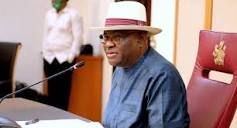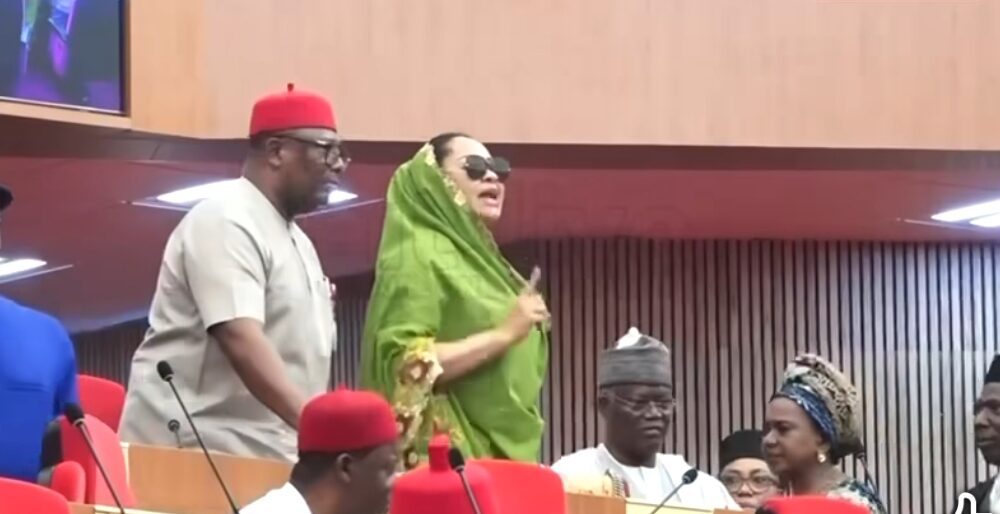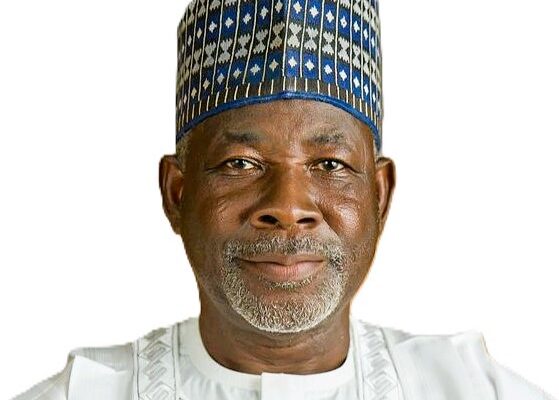By Ehichioya Ezomon
Nothing Nigerians haven’t heard, or seen happen in Nigeria. Thanks to former self-styled Military President, Ibrahim Badamasi Babangida, who says, “Nigeria is a country where anything goes.”
Babangida’s right! Where else – at least then in Africa – but in Nigeria would a well-organised presidential election be annulled by the same Gen. Babangida clique, and the winner of the poll, Chief MKO Abiola, arrested and detained by the Gen. Sani Abacha cabal, and died in detention under the Gen. Abdulsalami Abubakar junta?
Little wonder Nigerians weren’t surprised to hear that President Bola Tinubu “has gone into hiding,” to avoid pressures from cabinet seekers, and urged Nigerians to pray for him, so he could choose the right individuals for the jobs!
Senate Majority Leader, Opeyemi Bamidele (APC-Ekiti Central), revealed this on July 25 at his 60th birthday anniversary lecture and presentation of two books at the Yar’Adua Centre in Abuja.
President Tinubu asked Senator Bamidele to convey to the Senate and Nigerians that he’d make available the list of ministerial nominees within 48 hours, and went into hiding, “to avoid undue influence.”
Tinubu’s words: “Let me tell you (Senators), and you must encourage me. I need to make myself unavailable for the next 48 hours because a correspondence must come to the Senate, a very crucial correspondence.
“So, Mr (Senate) President, pray for me. We (you) should tell the rest of Nigerians to pray for me, to be able to make the right decision within the next 24 hours.”
Bamidele added: “When Nigerians hear the list of his ministers, they will say, ‘yes,… this is uncommon,’ and join us (Senators) to pray for Mr President. He needed to be away from any kind of influence.”
Ludicrous as that message looks, it’s heartening that Tinubu didn’t go into hiding on different grounds – like such periods he’d gone to Europe, and made himself incommunicado to Nigerians, who wanted to see and hear from him prior to and after the General Election in February-March 2023.
Yet, the fact that the President decided to hibernate for days – to put lobbyists at armslength – speaks volumes about Tinubu’s evolvement in barely two months.
Pre-inauguration on May 29 as President and Commander-in-Chief of the Armed Forces of Nigeria, supporters presented Tinubu as “uncrackable” under whatever conditions. And he lived up to that billing from the primaries through the campaigns and election, and the transition to assuming power.
He crowned his “invincibility” with some derring-dos – such as petrol “subsidy is gone” in his inaugural speech, and a follow-up floating of the Naira – thus creating real and artificial scarcity of petrol, goods and services, and sending prices sky-high across all sectors.
With subsidies also withdrawn from other publicly-provided services that’ve direct impact on poor and vulnerable Nigerians, the government now struggles to provide elusive palliatives to cushion the effects.
Thus, it comes as befuddling and unimaginable that the “Jagaban Borgu” would be hiding, to enable him “pick the right persons” for routine cabinet appointments.
What’d the President do if he’d to take weightier decisions on life and death of Nigerians or the corporate existence of Nigeria? Escape to Europe, Asia or the Americas?
Come on! Tinubu could’ve barred any person – even close family members – from “disturbing him,” and none would dare to breach the order in the presence of sentries.
Tinubu just wanted to “cruise” – as the ‘GenZs’ would say – and create a last-minute drama around the ministerial list. And his handlers saw in it a chance to weave a hallow of a methodical President about to make a consequential decision, which Tinubu called a “very crucial correspondence” to the Senate.
Notwithstanding the expeditious removal of petrol subsidy and floating of the Naira, the ministerial list was late in coming in the life of the Tinubu administration.
Many had expected Tinubu to break with the Nigerian “protocol,” and start to name or tease up his ministerial nominees piecemeal – along with their portfolios – as is the practice in diverse countries, particularly in the United States.
Before the list gets to Parliament, informed citizens would’ve known and “scrutinised” the nominees for the portfolios to be assigned to them. This aids the legislators’ work in approving the nominees.
Though it creates more drama and anticipation, involement of the public in “vetting” nominees helps to expose their quality in terms of character, capacity, competence and experience, and their fit for designated portfolios.
And it’s easier to get people’s buy-in into government’s policies and programmes if given the chance to assist in shaping the content of the cabinet.
So, delaying and hoarding of ministerial list doesn’t help any government – and it won’t help the Tinubu administration either.
Former President Muhammadu Buhari didn’t name his cabinet for six months. And when he did, the nominees came out majorly as low picks. And the result was crass incompetence and gross failure of many of the ministers on the job.
Like a magician, President Tinubu did “reappear” on July 27 from his hiding place, and submitted the list of first batch of 28 nominees.
Does the list meet expectations of Nigerians – with the length of time it took Tinubu to assemble, and forward the names to the Senate?
Normally, people from both sides of the divide will have something to say – positive or negative – about the list. Generally, does it worth the hide-and-seek, and the many “fake lists” paraded daily in the media?
Has Tinubu passed his famed head-hunting ability to assemble the “very best” for his cabinet as Governor of Lagos State (1999-2007) – that formed a linchpin in his campaign for President?
To Chief of Staff to the President, Rt Hon. Femi Gbajabiamila, Tinubu can yet form an ‘A-List’ cabinet.
The former Reps Speaker told reporters, after delivering the list of appointees to Senate President Godswill Akpabio that, “the President was painstaking in his choice of ministerial nominees.”
“That process started a while ago, culminating in the delivery of ministerial nominees today (July 27),” Gbajabiamila said.
“The President took his time, did a lot of due diligence going through the nominees one by one.
“Mr. President dissected those names with a fine-tooth comb and that’s what you’ve seen. Each of the persons on that list, I believe, is worth being there.
“It’s a good mix of people with political acumen and technocrats. So, this is a good balance and it’s needed.”
Game on, President Tinubu should “re-hit the ground running,” to ameliorate Nigerians’ immediate needs, and long-term well-being and prosperity he promises in his “Renewed Hope” agenda.
Nothing else will suffice in these times that most Nigerians are hurting, and deserving of succour from the government for survival!
Mr Ezomon, Journalist and Media Consultant, writes from Lagos, Nigeria




